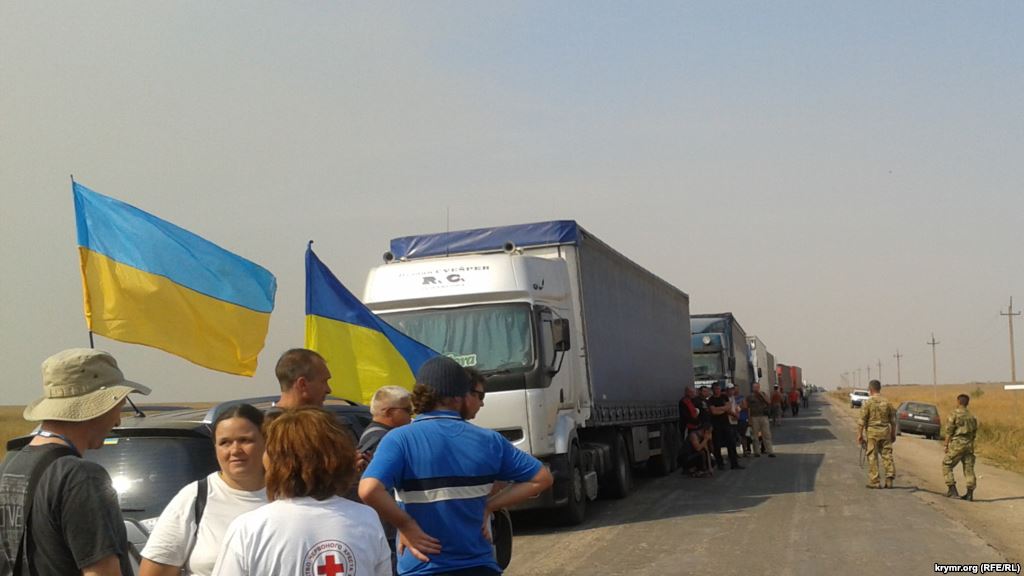
Blockade of Crimea Is Continuing Peacefully
Publication: Eurasia Daily Monitor Volume: 12 Issue: 178
By:

On September 20, Crimean Tatars launched a nonviolent protest action that they have named the “Citizens’ Blockade of Crimea” to suspend the transfer of goods from mainland Ukraine to the occupied territory of the Crimean peninsula. The peaceful blockade is taking place at Kalanchak, Chongar (headquarters) and Chaplinka—three main crossing points for Ukrainian goods. According to border records, a week before the Citizens’ Blockade started, 7,933 tons of food was transported through these checkpoints, of which 4,939 tons were vegetables and fruit (Segodnya.ua, September 17). These figures do not take into account the additional import of electrical supplies and wood products. Records indicate that, from the beginning of 2015 up to the present day, Ukrainian exports to Crimea amounted to $475 million (15minut.org, September 8).
On September 9, during a press conference in Kyiv, the exiled Crimean Tatar leadership explained the reasoning behind the planned blockade. Mustafa Cemilev stated that 80 percent of the Ukrainian goods delivered to Crimea from mainland Ukraine is shipped for resale to Russia through the narrow Kerch Strait, which separates the Crimean peninsula from Russia’s Krasnodar Krai (15minut.org, September 8). Cemilev noted that there are 80,000 Russian military personnel currently stationed in Crimea. He asserted that the remaining 20 percent of imported Ukrainian goods is sent directly to military bases and the troops of the Russian occupying forces, even though this supports Russia’s main objective of strengthening the military in Crimea against the Ukrainian state (UNIAN, September 17). The famed Crimean Tatar leader further argued that the responsibility for the financial, social and legal situation of residents in the occupied territories must belong to the occupiers, and not to the country whose territory has been occupied. Pointing out the absurdity of mixing war with business, Cemilev asked, “Are we trading or are we at war?” (Qha.com.ua, September 8).
Refat Chubarov, the chairman of the Mejlis (de facto quasi-governing assembly of Crimean Tatars) agreed that unrestricted trade between Crimea and mainland Ukraine, in fact, supports the occupying army (Freecrimea.com.ua, September 8). Therefore, Ukrainian businesses exporting to Crimea are trading in blood, Chubarov stated (Qha.com.ua, September 8).
The stated goals of the Crimean Tatars’ blockade are quite specific: to protect the rights and freedoms of citizens of Ukraine who remain in occupied Crimea; to end the policies of repression and discrimination against members of the Crimean Tatar movement; to achieve the release of political prisoners; to return a free media to the peninsula; to ensure human rights; and to bring about the ultimate de-occupation of Crimea. The action is supported not only by Crimean Tatars but other Ukrainian groups including “Automaidan,” “Self-Defense Maidan,” “Right Sector,” “Sich,” “Hort,” the territorial self-defense units of Melitopol, Nikolaev and Zaporozhye, as well as civil society activists from Lviv, Kyiv and other parts of Ukraine (Lb.ua, September 30). The Kherson volunteer battalion and local police officers have provided security for the activists. In the first days of the blockade, parliamentarians from different political parties as well as candidates for the upcoming local elections (to be held in Ukraine in a month) also came to the border area, where they enthusiastically told reporters of their support for the blockade (Colta.ru, September 28).
Cemilev has argued the blockade will only harm Ukrainian oligarchs and the Crimean occupying leadership. Previously, critics of the protest action had predicting that it would lead to the starvation of Ukrainian citizens, including Crimean Tatars, still residing in Crimea. According to Cemilev, to avoid such problems, the decision on the blockade was taken only after consultation with compatriots from Crimea to ensure they would be able to tolerate the resulting pressures and shortages caused by the Citizens’ Blockade (Nashdom.us, September 9).
Both Cemilev and Chubarov explained that the date selected for the start of the blockade—just days before Russian President Vladimir Putin’s speech at the United Nations—was chosen to revert global attention back to occupied Crimea and the increasing pressures endured by the Crimean Tatars (UNIAN, September 17).
Once the blockade began, at noon, on September 20, within hours hundreds of trucks carrying Ukrainian goods to the peninsula were backed up for three kilometers along the roads leading to the closed checkpoints (Facebook.com, September 19; Dunyabulteni.net, September 22). As of the end of the month, no trucks had been allowed to pass the Crimean border via the three checkpoints under blockade. The blockade had stopped the entrance of smuggled imports to Crimea, which the occupying Russian forces have been benefitting from, Chubarov stated (Qha.com.ua, September 28).
According to Russian sources (Argumenty.ru), only 197 trucks were able to enter Crimea, after first taking a long detour through Kharkiv, Belgorod, Rostov and across the Kerch crossing—a route longer than 1,900 kilometers (News-info.in.ua, September 24).
The participants of the Citizens’ Blockade of Crimea promise that the protest action at the three obstructed checkpoints will continue until the New Year (Qha.com.ua, September 23).




